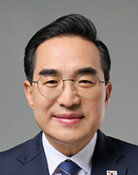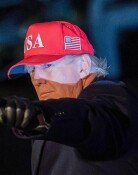North Korea`s Power Rankings
North Korea`s Power Rankings
Posted November. 09, 2010 10:31,
At the inter-Korean summit in June 2000, Kim Yong Nam, the chairman of North Koreas parliament, accompanied North Korean leader Kim Jong Il when the latter received visiting South Korean President Kim Dae-jung. As the North`s titular head of state, Kim Yong Nam is considered the No. 2 man in the communist country. When Kim Jong Il told him, "Old man, please take a seat," he declined, saying, "How can I?" Kim Jong Il again told him to sit but Kim Jong Nam declined again. When the leader shouted in anger, Please take your seat, the chairman finally sat as if feeling sorry.
In the wake of the death of Jo Myong Rok, an executive member of North Koreas politburo, attention is focusing on the ranking of Pyongyang`s power elite. One headline grabber is the dramatic rise of Kim Jong Ils youngest son Jong Un from sixth to second in just 40 days. Kim Jong Un rose to sixth in the rankings on Sept. 28, when he was named vice chairman of the Central Military Commission of the Norths ruling Workers Party at the party convention. The junior Kim rose to the No. 2 post on the list of funeral committee members for the late Jo, whose death was announced Sunday. Kim Yong Nam, chief cabinet minister Choe Yong Rim, and general chief of staff Ri Yong Ho of the Norths military were all behind the young Kim Jong Un, 27.
The North announces its power rankings at official events, including at the assembly of the Supreme Peoples Congress and party conventions. The lists of funeral committee members released when a ranking government official dies serve as a good reference. South Korea and the West pay keen attention to the order of top-ranking officials on such lists to see who ranks where in the Pyongyang hierarchy. Such an event is a good opportunity for checking the rise and fall of elites, but the order of power rankings is meaningless as seen in the case of Kim Yong Nam.
Jo, who died three days ago, was the de facto No. 2 man when he served as first vice chairman of the Central Military Commission. When Kim Jong Il`s brother-in-law Jang Song Taek was named vice chairman last year, experts on North Korea believed Jang had become the No.2 man. He was demoted, however, to No. 22 in the rankings of funeral committee members this time. As was the case in the Kim Il Sung era, the rankings of the power elite are determined purely at the personal discretion of the person in power. Hence the rankings except those of Kim Jong Il and his son are effectively meaningless. The North`s power rankings probably put Kim Jong Il at No. 1 and his Jong Un at No. 1-1. In the top echelon of the Norths hierarchy, power is merely being transferred from No. 1 to the potential No. 2 as part of a family succession.
Editorial Writer Bhang Hyeong-nam (hnbhang@donga.com)







